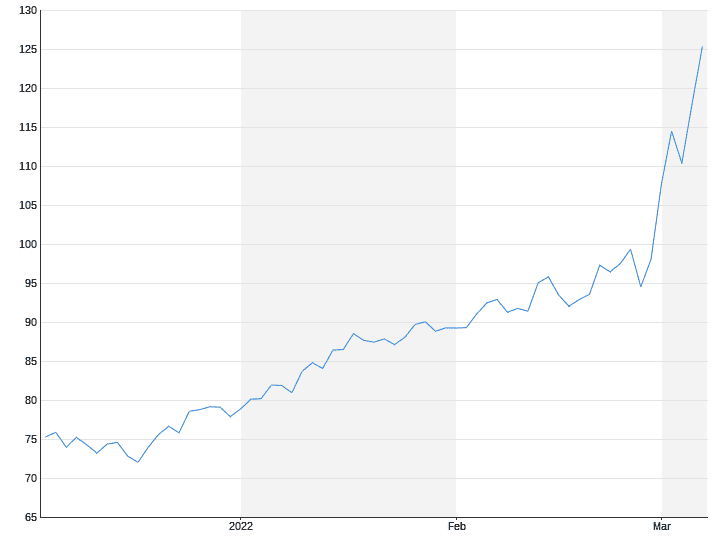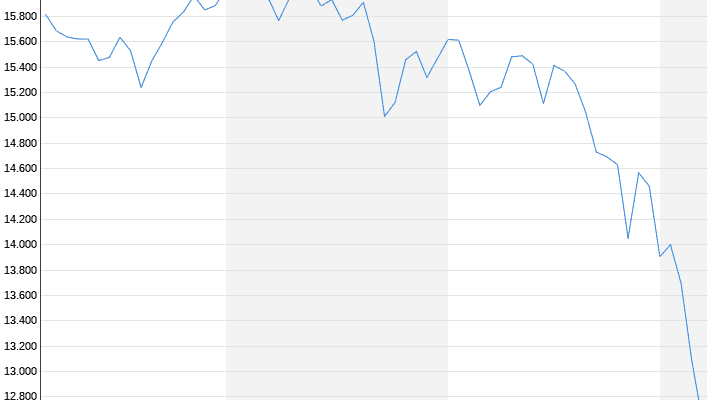specter of stagflation
Oil price shock pushes stock market into the red
03/07/2022, 1:15 p.m
Russia’s war against Ukraine is having a massive impact on global markets. Oil prices shoot up after the US considers halting its purchases from Moscow. The consequences are reflected in almost all sectors.
The fear of an energy crisis in Europe and its economic consequences has the stock markets firmly in its grip. The discussion about a ban on Russian energy supplies drove the European natural gas price to a record high. The Brent crude oil variety from the North Sea started to jump above the previous record from 2008. “With a ban on energy imports, in the short term we will have a situation where governments will have to ration certain commodities,” warned Elwin de Groot, Rabobank’s chief investment strategist. Then fell DAX and EuroStoxx50 by three percent and two percent respectively.
However, both indices have recovered somewhat. Shortly after trading began, they fell by four percent each. The signs were also deep red in Paris and Milan. “There is a growing fear that the conflict will put a strain on the global economy, which is already struggling to overcome the consequences of the pandemic,” said Kunal Sawhney, head of research house Kalkine. Hopes for a strong economic recovery are fading. No help can be expected from the central banks, warned investment strategist Jürgen Molnar from the brokerage house RoboMarkets. “In the best-case scenario, they keep their feet still instead of raising interest rates as announced.”
From a technical point of view, the stock exchanges are considered massively oversold. “But there is no sign of bottoming out,” says Martin Utschneider from Bankhaus Donner & Reuschel, looking at the DAX. With an embargo on Russian energy supplies, as is currently being discussed, consumers would have to deal with permanently higher prices, said analyst Jochen Stanzl from the online broker CMC Markets. This would hit consumption and economic growth hard. “A recession in Germany with high inflation is becoming more and more of a baseline scenario.”
+++ Follow the trading day in our stock market ticker +++

Because of the embargo discussion, the European steered Natural Gas Future with an increase of 63.4 percent towards the largest daily gain in its history and at 335 euros per megawatt hour was higher than ever. The price of the crude oil variety Brent from the North Sea jumped nearly 20 percent to hit a 13-1/2-year high of $139.13 a barrel (159 liters). “If all Russian energy exports were sanctioned, a Brent price of more than $200 would not surprise me,” said OCBC economist Howie Lee.
A US embargo is considered likely on the futures markets. The potential loss of the second largest oil supplier in the world would lead to a loss of supply that could hardly be compensated for, the market said in the morning. As a result, the Russian oil supply, which was still flowing in the previous week, is gradually being priced out, while the possible supply of oil from Iran is being priced in, a market strategist said.
Raw materials are becoming massively more expensive
Other commodities are also seeing panic buying, said Neil Wilson, chief analyst at online brokerage Markets.com. So the price went up palladium at times by almost 15 percent to a record high of $3440.76 per troy ounce (31.1 grams) and faced the third-largest daily gain in its history. “Russia represents 38 percent of global palladium production,” said Commerzbank analyst Daniel Briesemann. “Delivery failures could not be absorbed otherwise.”
At the same time, the one used in steel production was recorded nickel a record jump in price of a good 31 percent and, at $38,000 a ton, was quoted as high as it was almost 15 years ago. “The offer was already tight,” said Kalkine expert Sawhney. “If a major supplier fails, it triggers a cascading effect.”
The flight of the wheat price also went further: The European future rose by 14 percent to a record high of 424 euros per ton. “As long as the fighting in Ukraine does not end, a resumption of exports from Russia and Ukraine is not to be expected,” says a broker. Since customers are now desperately looking for other sources, other producers are threatened with export restrictions. Hungary has already banned wheat exports with immediate effect.
Speculations on business losses because of the impending recession sent the domestic financials downhill. The index for banks in the euro zone fell by almost ten percent, as strong as it was last during the stock market crash in March 2020. Institutions with a large exposure to Russia are particularly hard hit. The titles of Raiffeisen Bank, Societe Generale (SocGen) and HypoVereinsbank parent company Unicredit each recorded double-digit percentage price losses.
The euro also came under pressure, falling as much as a percent to a two-year low of $1.0804. Because of the economic risks, the European Central Bank (ECB) will probably continue its asset purchases beyond the second quarter at its meeting on Thursday and thus postpone a possible interest rate hike further, forecast economist Tapas Strickland from the National Australia Bank.
The flight to “safe havens” pushed the euro below par with the Swiss franc for the first time in seven years. Gold was also in demand. For domestic investors, the precious metal was more expensive than ever at EUR 1,850.67 per troy ounce. Inflation-linked government bonds were also popular. This pushed yields on ten-year German and French bonds to record lows of minus 2.513 and minus 2.272 percent, respectively.
